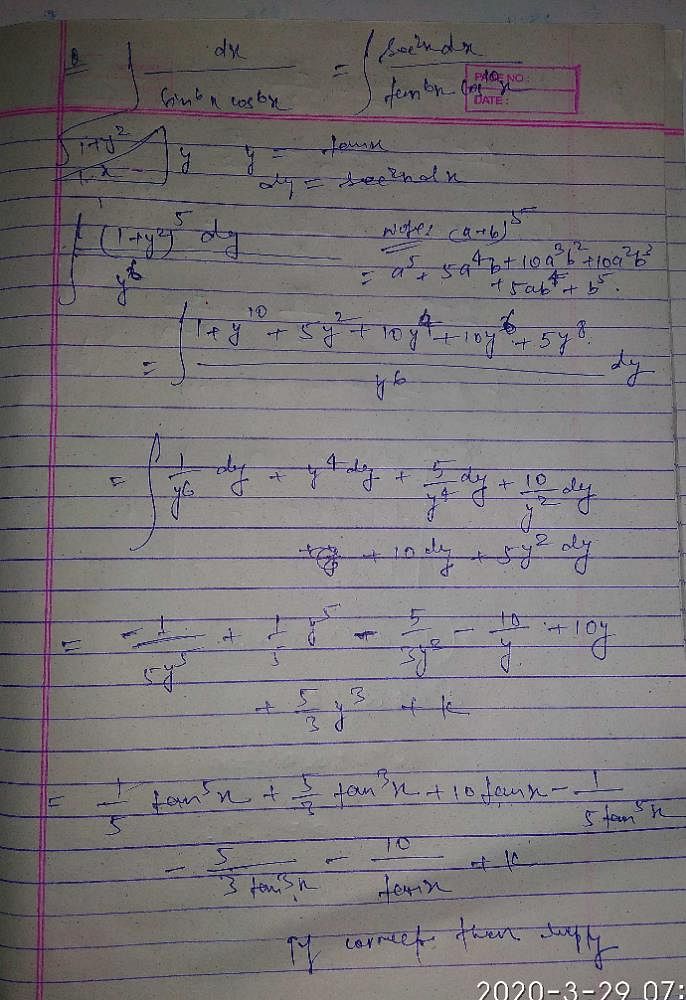JEE Exam > JEE Questions > Indefinite integral of 1/cos^6x sin^6x?
Start Learning for Free
Indefinite integral of 1/cos^6x sin^6x?
Most Upvoted Answer
Indefinite integral of 1/cos^6x sin^6x?
Indefinite Integral of 1/cos^6x sin^6x
When finding the indefinite integral of a function, we aim to find the antiderivative of the function. In other words, we look for a function whose derivative is the given function. In this case, we are given the function 1/cos^6x sin^6x and we need to find its indefinite integral.
Step 1: Simplify the Function
Before we can integrate the function, we need to simplify it. We can do this by using trigonometric identities. We know that:
- cos^2x + sin^2x = 1
- 1/cos^2x = sec^2x
- 1/sin^2x = cosec^2x
Using these identities, we can simplify 1/cos^6x sin^6x as follows:
1/cos^6x sin^6x = (1/cos^2x)^3 (1/sin^2x)^3
Substituting the identities for 1/cos^2x and 1/sin^2x:
(sec^2x)^3 (cosec^2x)^3 = sec^6x cosec^6x
So, 1/cos^6x sin^6x = sec^6x cosec^6x
Step 2: Use the Power Reduction Formula
Now that we have simplified the function, we can use the power reduction formula to integrate it. The power reduction formula is:
sin^m x cos^n x dx = (1/2) sin^(m-1) x cos^(n+1) x dx - (m-1)/(2n+2) sin^(m-3) x cos^(n+2) x dx
Using this formula with m = n = 3, we get:
sec^6x cosec^6x dx = (1/2) sec^3x cosec^7x dx - (3/10) sec^3x cosec^9x dx
Step 3: Integrate the Function
Now that we have simplified the function and applied the power reduction formula, we can integrate it. Integrating the first term:
(1/2) sec^3x cosec^7x dx = (1/2) ∫ sec^3x cosec^7x dx
We can use the substitution u = sin x to solve this integral. Using the identity 1 + tan^2x = sec^2x, we can write:
∫ sec^3x dx = ∫ sec^3x (1 + tan^2x)/ (1 + tan^2x) dx
Substituting u = sin x:
∫ sec^3x dx = ∫ (1 + tan^2x)/ (
Attention JEE Students!
To make sure you are not studying endlessly, EduRev has designed JEE study material, with Structured Courses, Videos, & Test Series. Plus get personalized analysis, doubt solving and improvement plans to achieve a great score in JEE.

|
Explore Courses for JEE exam
|

|
Similar JEE Doubts
Indefinite integral of 1/cos^6x sin^6x?
Question Description
Indefinite integral of 1/cos^6x sin^6x? for JEE 2024 is part of JEE preparation. The Question and answers have been prepared according to the JEE exam syllabus. Information about Indefinite integral of 1/cos^6x sin^6x? covers all topics & solutions for JEE 2024 Exam. Find important definitions, questions, meanings, examples, exercises and tests below for Indefinite integral of 1/cos^6x sin^6x?.
Indefinite integral of 1/cos^6x sin^6x? for JEE 2024 is part of JEE preparation. The Question and answers have been prepared according to the JEE exam syllabus. Information about Indefinite integral of 1/cos^6x sin^6x? covers all topics & solutions for JEE 2024 Exam. Find important definitions, questions, meanings, examples, exercises and tests below for Indefinite integral of 1/cos^6x sin^6x?.
Solutions for Indefinite integral of 1/cos^6x sin^6x? in English & in Hindi are available as part of our courses for JEE.
Download more important topics, notes, lectures and mock test series for JEE Exam by signing up for free.
Here you can find the meaning of Indefinite integral of 1/cos^6x sin^6x? defined & explained in the simplest way possible. Besides giving the explanation of
Indefinite integral of 1/cos^6x sin^6x?, a detailed solution for Indefinite integral of 1/cos^6x sin^6x? has been provided alongside types of Indefinite integral of 1/cos^6x sin^6x? theory, EduRev gives you an
ample number of questions to practice Indefinite integral of 1/cos^6x sin^6x? tests, examples and also practice JEE tests.

|
Explore Courses for JEE exam
|

|
Suggested Free Tests
Signup for Free!
Signup to see your scores go up within 7 days! Learn & Practice with 1000+ FREE Notes, Videos & Tests.


























